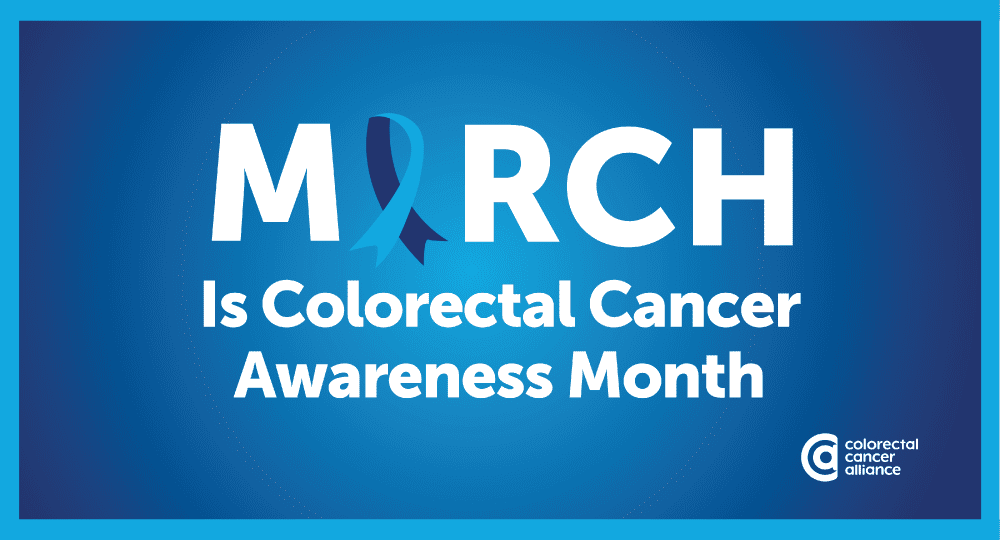Every March we raise awareness about Colorectal Cancer – below is a quiz to test your knowledge about colorectal cancer. Hopefully, you will learn something new as you work your way through the questions. For more information about colorectal cancer awareness – please visit www.ccalliance.org
- During which month do we focus on promoting awareness of colorectal cancer? Answer: March. (That was a freebie!). Blue ribbons are used as reminders.
- How prevalent is colorectal cancer? Answer: Excluding skin cancers, colorectal cancer is the third most common cancer for both men AND women in the United States. Put another way, that means that 1 in 22 men and 1 in 24 women will face this diagnosis. (www.cancer.org)
- What are the risk factors for colon cancer? Answer: According to the Mayo Clinic, risk factors include:
- Older age (although the rates of colon cancer for those under 50 have been rising).
- Race (African Americans are at higher risk than people of other races).
- Personal history of colorectal cancer or polyps.
- Inflammatory intestinal conditions.
- Inherited syndrome
- Family history
- Diets low in fiber and high in fat
- Sedentary lifestyle
- Diabetes
- Obesity
- Smoking
- Alcohol use
- Personal history of radiation therapy to the abdomen
- What are the warning signs? Answer: Although there may be no symptoms in the early stages, any of the following should be discussed with your physician:
- A persistent change in bowel habits
- Rectal bleeding or blood in your stool
- Persistent abdominal discomfort (cramps, gas, or pain)
- A feeling of incomplete bowel emptying
- Weakness or fatigue
- Unexplained weight loss (Mayo Clinic)
- For people of average risk, what is the recommended age to start being screened for colon cancer? Answer: Did you say, “50”? Oops. Only half credit for that answer. On May 30, 2018, the American Cancer Society released an updated guideline for colorectal cancer screening. The recommended age is now 45 for people at average risk (due to the increasing rates of diagnosis for people under the age of 50, as noted in #3).
- How does one get screened for colorectal cancer? Answer: Most screening falls into one of two categories:
- Stool testing: These tests look for blood in the stool, often not visible (occult), or even for genetic indicators of the presence of colorectal cancer.
- Visual (structural) exams (this includes methods such as colonoscopy or specialized imaging tests). (American Cancer Society).
- What is a virtual colonoscopy? Answer: This is a method of screening for colon cancer that utilizes CT scans (computed tomography). CT scans are special X-rays that allow for 3-D imaging of the colon which can reveal colon polyps. This may be of benefit for patients who are not candidates for a conventional colonoscopy due to the use of blood-thinning medications, for example. (Johns Hopkins Medicine).
- What is a Capsule Endoscopy? Answer: This is another alternative to conventional colonoscopies. The person being screened swallows a tiny, disposable camera, which takes and transmits pictures of the colon as it works its way through the digestive system. It is currently approved for patients who have had incomplete colonoscopies, not due to poor preparation (American Pharmacists Association)
- Can anything be done to prevent colon cancer? Answer: In some cases, yes. Correction of some of the risk factors already mentioned (avoiding smoking, alcohol, inactivity and weight gain) are all helpful in improving your odds. Regular screening as recommended can help to identify and remove polyps, hopefully before they have become malignant. Some studies suggest that vitamins (such as folate and vitamin D) and adequate intake of calcium and magnesium may be beneficial. Many studies have also suggested that regular use of aspirin or other non-steroidal anti-inflammatory drugs may also lower the risk of developing colorectal cancer and polyps. Limiting and avoiding red and processed meats and eating more fruits and vegetables is also thought to lower your risk of developing colon cancer. (American Cancer Society).
- What is the Colossal Colon? Answer: The Colossal Colon was created by Molly McMaster, after being diagnosed with colon cancer at the age of 23. It was a 40 foot long, 4 foot tall model of the human colon, built for people to walk (crawl) through, that illustrated various colon pathologies. Windows allowed people to view from the outside if they preferred). It toured the country for 13 years, in a quest to raise awareness and educate people. It has since retired to the Houston Health Museum, where visitors can still view representations of Crohn’s disease, diverticulosis, ulcerative colitis, hemorrhoids, polyps, and colon cancer. (colonclub.com)
- Can’t travel to Houston? Want to host your own event? It is now possible to purchase an inflatable colon for your next event; mini, medium and giant sizes are available for purchase, and “medium colon” is now available for rent. (Colorectal Cancer Alliance).
Happy Colorectal Cancer Awareness Month!
—
Featured image courtesy of Colorectal Cancer Alliance





